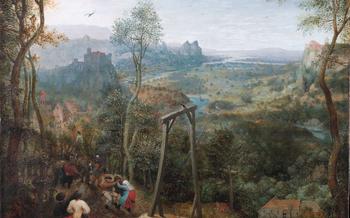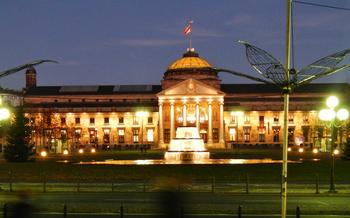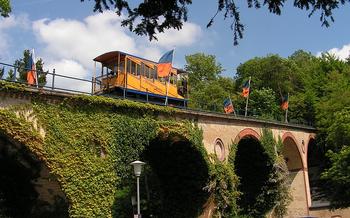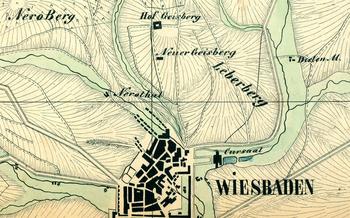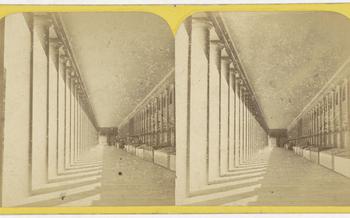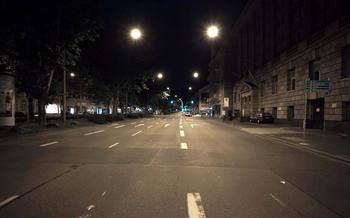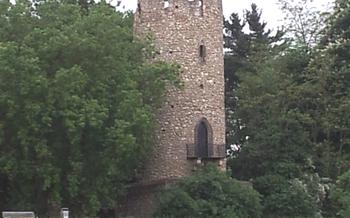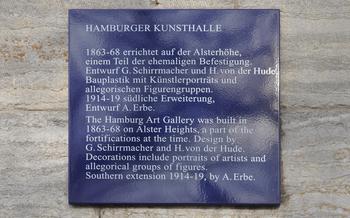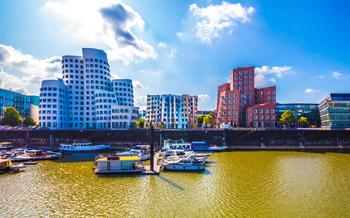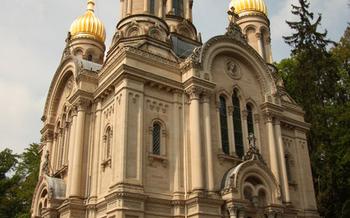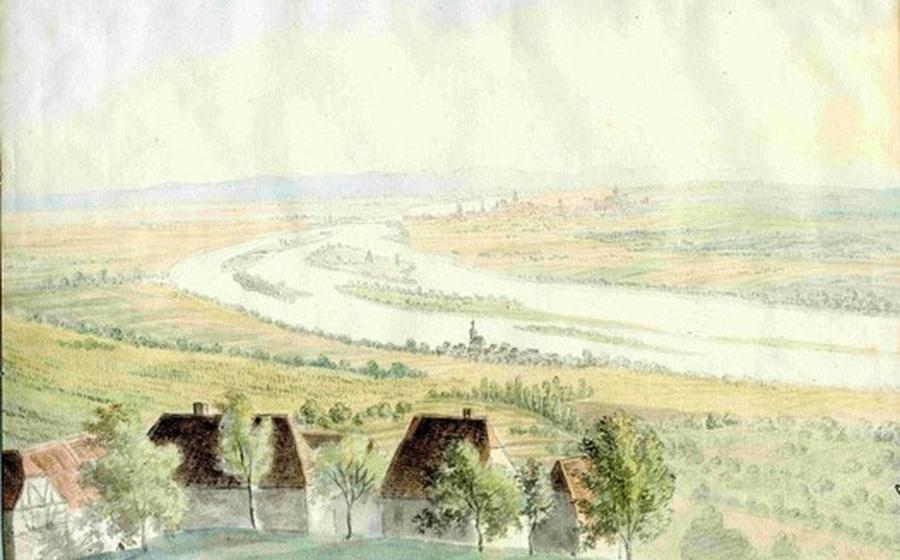
The Wiesbaden City Museum at the Markt
- The Wiesbaden City Museum
- Permanent Exhibitions
- Temporary Exhibitions
- Guided Tours
- Educational Programs
- Research Facilities
- Accessibility
- Museum Shop
- Café and Restaurant
- Architecture of the Building
- Photography and Videography
- Parking and Transportation
- Hours of Operation and Admission Fees
- Insider Tip: Uncover the Hidden Treasures of Wiesbaden's City Museum
The Wiesbaden City Museum
The Wiesbaden City Museum is a treasure trove of history and culture, nestled in the heart of the vibrant city of Wiesbaden, Germany. Founded in 1898, the museum has become a prominent institution dedicated to preserving and showcasing the rich heritage of the city and the surrounding region. In its stately neo-Gothic building, the museum takes visitors on a journey through time, offering a diverse range of permanent and temporary exhibitions that explore the city's fascinating past, its artistic achievements, and its contributions to various fields.
The museum's location, within easy walking distance from the city center, makes it a convenient and accessible destination for both locals and tourists. Its proximity to other cultural attractions, such as the Hessian State Museum and the Kurhaus, further enhances its appeal as a must-visit destination in Wiesbaden.
Permanent Exhibitions
The Wiesbaden City Museum boasts an impressive array of permanent exhibitions that take visitors on a captivating journey through the city's rich history, culture, and heritage. These exhibitions showcase a diverse range of artifacts, documents, and interactive displays that provide a comprehensive understanding of Wiesbaden's past and its transformation into the vibrant city it is today.
One of the highlights of the permanent collection is the exhibition on Wiesbaden's thermal springs. Visitors can explore the fascinating history of these healing waters, which have attracted people to the city for centuries. Interactive displays and multimedia presentations bring to life the stories of those who have sought relief and rejuvenation in Wiesbaden's thermal baths.
Another must-see exhibition focuses on the city's architectural heritage. Wiesbaden is renowned for its elegant buildings and grand villas, many of which date back to the 19th century. This exhibition showcases the work of renowned architects who have shaped the city's unique cityscape, including Christian Zais and Friedrich von Thiersch.
The museum also houses an extensive collection of art and artifacts from various periods of history. Visitors can admire paintings, sculptures, and decorative arts from the Middle Ages to the present day. The collection includes works by local artists as well as renowned masters such as Lucas Cranach the Elder and Max Liebermann.
In addition to these permanent exhibitions, the Wiesbaden City Museum regularly hosts temporary exhibitions on a wide range of topics related to the city's history and culture. These exhibitions often feature special guest curators and offer a fresh perspective on Wiesbaden's past and present.
Temporary Exhibitions
The Wiesbaden City Museum regularly hosts temporary exhibitions that explore a wide range of topics related to the city's history, culture, and art. These exhibitions often feature artifacts, documents, and artworks from the museum's own collection, as well as loans from other institutions. Temporary exhibitions are typically held for several months at a time, and they offer visitors a chance to see new and exciting material that is not on permanent display.
To stay updated on upcoming temporary exhibitions, visitors can check the museum's website or follow the museum on social media. The museum also publishes a monthly newsletter that features information about upcoming events and exhibitions.
Some recent temporary exhibitions at the Wiesbaden City Museum have included:
- "Wiesbaden in the 1920s: A City of Art and Culture"
- "The History of the Wiesbaden Kurhaus"
- "Women in Wiesbaden: A Century of Change"
- "The Art of the German Expressionists"
Temporary exhibitions at the Wiesbaden City Museum are a great way to learn more about the city's history and culture. They also offer visitors a chance to see new and exciting artifacts and artworks that are not on permanent display.
Guided Tours
The Wiesbaden City Museum offers guided tours that provide visitors with a deeper insight into the museum's collections and exhibitions. These tours are led by knowledgeable and experienced guides who share their expertise and enthusiasm with visitors.
There are different types of guided tours available, catering to various interests and needs. General tours provide an overview of the museum's highlights and history, while thematic tours focus on specific aspects of the collections, such as art, history, or archaeology. The museum also offers special tours for children and families, designed to engage young visitors and make learning fun.
Tours are available in German and English, and other languages can be arranged upon request. Advance booking is recommended to secure a spot, especially for groups or during peak tourist season. Visitors can book tours online through the museum's website or by contacting the museum directly.
Educational Programs
The Wiesbaden City Museum offers a wide range of educational programs designed to engage and inspire visitors of all ages. For children and families, the museum hosts interactive workshops, storytelling sessions, and hands-on activities that bring history to life. These programs encourage children to explore the museum's exhibits, learn about the past, and develop their creativity and critical thinking skills.
The museum also organizes lectures, workshops, and other events for adults, covering various topics related to local history, art, and culture. These programs provide opportunities for in-depth learning and discussion, allowing participants to delve deeper into the museum's collections and explore new perspectives.
To participate in the educational programs, visitors can check the museum's website or inquire at the information desk. Registration is often required for workshops and special events, and fees may apply. The museum strives to make its educational programs accessible to everyone, and discounts or scholarships may be available for certain groups or individuals.
Research Facilities
The Wiesbaden City Museum boasts an extensive research library and archives, housing a wealth of historical documents and resources that cater to scholars, researchers, and history enthusiasts. The library's collection includes rare books, manuscripts, and periodicals, offering insights into the city's past and cultural heritage. The archives house an impressive array of documents, including photographs, maps, and personal papers, providing valuable primary source material for research projects.
Access to the research facilities is granted to researchers upon request. Prior registration and submission of a research proposal are required to ensure the availability of relevant materials. The museum's staff is dedicated to assisting researchers in their endeavors, providing guidance and facilitating access to the collections. Scholars can utilize the library's reading room, equipped with comfortable seating and research tools, to delve into the historical treasures of Wiesbaden.
The museum's research facilities are an invaluable resource for anyone seeking to explore the history of Wiesbaden in depth. Whether you're a student conducting research for a thesis, a historian delving into the city's past, or simply an individual with a passion for local history, the Wiesbaden City Museum's research facilities offer a wealth of knowledge and inspiration.
Accessibility
The Wiesbaden City Museum is committed to providing an inclusive and accessible environment for all visitors. Wheelchair users and visitors with limited mobility can enjoy a barrier-free experience thanks to the museum's thoughtful design. Ramps and elevators ensure that all levels of the museum are accessible, allowing everyone to navigate the exhibits with ease.
The museum also offers special provisions for visitors with visual or hearing impairments. Visually impaired visitors can request tactile maps and audio guides that provide detailed descriptions of the exhibits. Hearing-impaired visitors can take advantage of sign language interpreters upon request. The museum's staff is trained to assist visitors with disabilities and ensure that everyone has an enjoyable and informative experience.
By prioritizing accessibility, the Wiesbaden City Museum demonstrates its commitment to creating a welcoming and inclusive environment for all visitors, regardless of their abilities or disabilities.
Museum Shop
The Wiesbaden City Museum boasts a well-stocked museum shop where visitors can purchase a variety of souvenirs, books, and other merchandise related to the museum's collections and exhibitions. The shop is located conveniently within the museum premises, making it easy for visitors to browse and shop after exploring the exhibits.
The museum shop offers a wide selection of items to cater to diverse interests and budgets. Visitors can find books on Wiesbaden's history, culture, and art, as well as postcards, posters, and other printed materials featuring images from the museum's collection. There is also a range of souvenirs such as magnets, keychains, and replicas of historical artifacts, perfect for those who want to take a piece of the museum experience home with them.
The shop also stocks a variety of educational toys and games for children, making it a great place to pick up gifts for young history enthusiasts. Visitors can also find unique and thoughtful gifts for friends and family, such as jewelry inspired by historical designs or home décor items with a historical twist.
The museum shop is staffed by friendly and knowledgeable personnel who are always happy to assist visitors with their purchases or answer any questions they may have. The shop accepts various payment methods, including cash, credit cards, and debit cards, making it convenient for visitors to make their purchases.
Café and Restaurant
Indulge in culinary delights at the charming café or restaurant located within the Wiesbaden City Museum. As you savor delectable dishes, immerse yourself in the vibrant atmosphere and soak up the museum's unique ambiance. The menu features a range of options, catering to diverse tastes and preferences. From light snacks and refreshing beverages to hearty meals that celebrate local cuisine, there's something for everyone to enjoy.
While savoring your culinary journey, bask in the enchanting ambiance of the café or restaurant. The tasteful décor and carefully curated seating arrangements create an inviting space that complements the museum's artistic and historical charm. Whether you seek a quick bite between exhibits or a leisurely lunch with friends, this delightful dining venue offers a memorable experience that enhances your visit to the Wiesbaden City Museum.
Architecture of the Building
The Wiesbaden City Museum is housed in a magnificent building that is a testament to the city's rich history. Constructed between 1892 and 1894, the building was originally designed to serve as the city's market hall. The neo-Gothic exterior, characterized by its intricate brickwork and tall, arched windows, reflects the architectural style prevalent during that period.
Inside, the museum's grand hall features a soaring ceiling supported by elegant iron columns. The walls are adorned with murals depicting scenes from Wiesbaden's past, adding to the building's historical charm. The museum's thoughtful design ensures that the exhibits are showcased in a visually appealing and engaging manner, enhancing the overall visitor experience.
The building's prominent location in the heart of Wiesbaden, adjacent to the bustling marketplace, makes it a striking landmark that blends seamlessly with the city's architectural heritage. It serves as a reminder of the city's transformation from a small market town to a thriving cultural and economic center.
Photography and Videography
Photography and videography are generally allowed inside the Wiesbaden City Museum, but there are some restrictions to ensure the preservation of the exhibits and the comfort of other visitors.
-
Visitors are permitted to take photographs and videos for personal, non-commercial use. However, the use of flash photography or tripods is prohibited to avoid damaging the delicate artifacts and paintings.
-
Commercial photography and videography require prior permission from the museum administration. Professional photographers and videographers must obtain a permit in advance and may be subject to specific guidelines and fees.
-
Visitors are kindly requested to be respectful of other visitors and avoid disturbing them while taking photographs or videos. It is important to maintain a quiet and contemplative atmosphere within the museum galleries.
-
The museum staff is always happy to assist visitors with any questions or concerns regarding photography and videography policies. They can provide guidance on the best angles and lighting conditions to capture the exhibits effectively while adhering to the museum's regulations.
Parking and Transportation
The Wiesbaden City Museum offers convenient parking options for visitors traveling by car. The museum's designated parking lot, located just a short walk away, provides ample space for both regular-sized vehicles and buses. Visitors can easily enter and exit the lot, ensuring a hassle-free parking experience.
For those who prefer to use public transportation, the museum is well-connected by various bus lines. Several bus stops are situated within a short walking distance, making it easy for visitors to reach the museum from different parts of the city. The bus schedules are designed to provide regular and convenient service, ensuring that visitors can plan their trip accordingly.
Additionally, the museum's location encourages eco-friendly transportation options. Visitors who enjoy cycling can take advantage of the designated bike racks located near the entrance. These secure racks provide a convenient and safe place to park bicycles, promoting sustainable transportation and a healthy lifestyle.
Hours of Operation and Admission Fees
The Wiesbaden City Museum is open to the public from Tuesday to Sunday, with varying hours depending on the day. On Tuesdays, the museum is open from 11 am to 5 pm, while from Wednesday to Sunday, it remains open from 10 am to 6 pm. It is closed on Mondays.
To ensure a hassle-free visit, the museum offers regular admission fees that are quite reasonable. Adults are charged €6 for a standard ticket, while reduced rates of €4 apply to students, seniors, and groups of 10 or more. Children under the age of 18 enjoy free admission, making it an excellent opportunity for families to explore the museum's wonders.
Additionally, the museum provides free admission on the first Sunday of every month, allowing visitors to delve into the city's history and culture without any financial burden. Keep an eye out for special promotions and events throughout the year, which may offer further discounts or free admission opportunities.
Remember to check the museum's website or contact them directly for the most up-to-date information on hours of operation, admission fees, and any special offers. Plan your visit accordingly to make the most of your time exploring Wiesbaden's rich heritage.
Insider Tip: Uncover the Hidden Treasures of Wiesbaden's City Museum
Beyond the well-known highlights, the Wiesbaden City Museum holds many hidden gems waiting to be discovered by curious visitors. One such treasure is the Römertor, a preserved Roman gate that offers a glimpse into the city's ancient past. Located in the museum's courtyard, this impressive gate dates back to the 3rd century AD and served as a significant entrance to the Roman settlement.
Another hidden gem is the Biebrich Palace Porcelain Collection, showcasing exquisite porcelain masterpieces from the renowned Biebrich Porcelain Manufactory. This collection features delicate figurines, tableware, and decorative items that reflect the artistry and craftsmanship of the 18th and 19th centuries.
For those interested in contemporary art, the museum's Temporary Exhibitions often showcase thought-provoking and innovative works by emerging and established artists. These exhibitions explore a wide range of themes and mediums, providing visitors with a fresh perspective on contemporary artistic expression.
To enhance your visit, consider joining one of the museum's Themed Tours, which offer a deeper dive into specific aspects of the collection. Whether you're interested in local history, art, or a particular era, these tours provide a personalized and informative experience led by knowledgeable guides.
Finally, don't miss the opportunity to visit the museum's Research Library, which houses an extensive collection of books, documents, and artifacts related to Wiesbaden's rich history and culture. This valuable resource is open to researchers, students, and the general public, providing a wealth of information for those seeking to delve deeper into the city's past.
